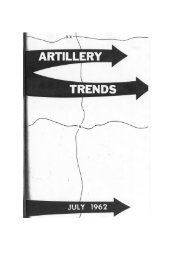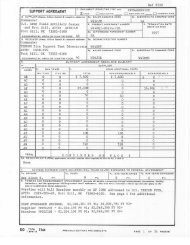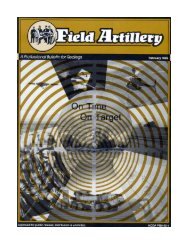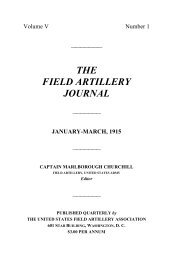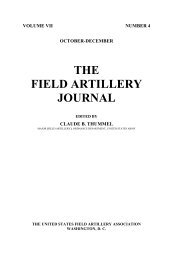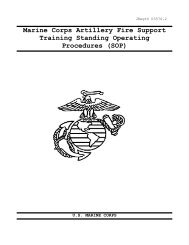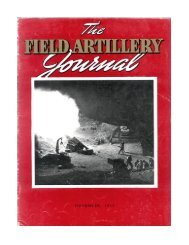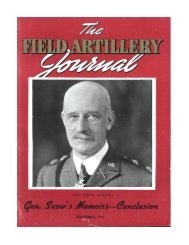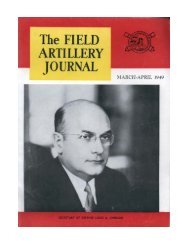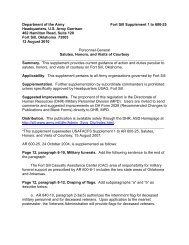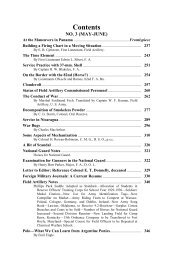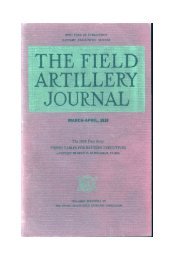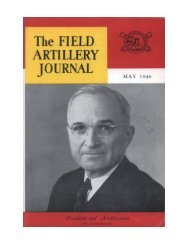september - october - Fort Sill
september - october - Fort Sill
september - october - Fort Sill
Create successful ePaper yourself
Turn your PDF publications into a flip-book with our unique Google optimized e-Paper software.
COMPARISONS, AGAIN<br />
BY CAPTAIN GEORGE P. WINTON, F.A.<br />
IT IS not unusual to encounter the assertion that soldiers suffer from a<br />
peculiar mental state known as the military mind. This condition or point of<br />
view is a favorite target for civilians writing on military subjects. Generally<br />
their arguments come to this: that officers steeped in the traditions of the<br />
Army and schooled in its thought are incapable of proper judgment in the<br />
very elements of the profession—arms and the use of weapons. Instances<br />
are given of the British Generals' insistence on the use of shrapnel against<br />
entrenched troops, of their reluctance in using tanks, of their repeated use<br />
of the same type of offensive which had time after time proved inadequate<br />
and cruelly costly in casualties.<br />
Probably there is a certain amount of truth in the contention that there is<br />
stubborness in the mental attitude of some officers on the questions that<br />
vitally concern the Service. Tractor motor power for artillery is a case in<br />
point. Discussion of the question is difficult, and comparison of animal and<br />
mechanical motive power is not easy, for the reason that proponents and<br />
opponents of each type have different conceptions of the abilities and<br />
limitations of each kind. It is not necessarily the military mind at work; but<br />
a general desire to see the Army follow no unwise policy.<br />
However, without forgetting the fine traditions and magnificent<br />
achievements of horse-drawn artillery in the past, many officers are<br />
convinced that the motor artillery will be responsible for the achievements<br />
in the future.<br />
The "next war," that strange conflict, that dark time for which the army<br />
exists, is in the future. Its place and its nature are unknown and it is only in<br />
the light of experience in past wars and by observing the rate of invention<br />
in weapons that preparation can be made for it. Generalities are of little<br />
value in this preparation, yet many things can be stated only in general<br />
terms. One of these is the commonplace, "we live in a motor age." Though<br />
wholly agreeing in this, the writer must confess that he is no motor expert<br />
and that the ideas he has were forced on him by the pressure of events that<br />
he experienced with his battery in the late war.<br />
This particular battery was organized after the outbreak of the war<br />
largely from recruits, yet with a considerable number of non-coms from<br />
the old Regular Army. After a short period of training the battery was<br />
sent to France as a unit of the Artillery of the 3rd Division, served<br />
throughout the campaigns in this division and went with it to Germany<br />
as part of the occupation forces, where it underwent<br />
509




